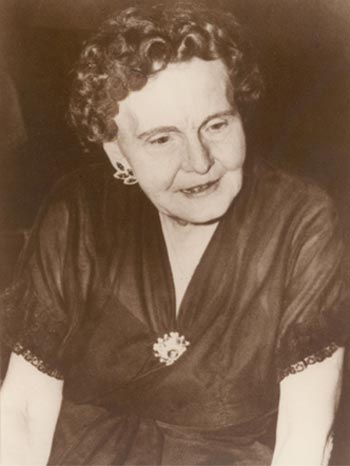
|

|
Spirits of Sanger School, Miss Nina still speakBetsy Vardaman |
|
Peace. Since the thunder of artillery in the Middle East has ended, the language of far-off war — "sorties," "surgical strikes," and "ordnances" — may now be re- placed in our minds with thoughts of spring. News of the war and now of the peace has pervaded our going out and coming in. I am glad to have permission this good March day to think of other things. Perhaps I began reminiscing about simpler times to escape the complex new realities bombarding my mind. Or maybe I am yearning for yesterday because my cousin recently sent me two enormous albums of memories of my aunt, Miss Nina Birdena Glass, principal for 38 years of Sanger Elementary School. To open the large, red leather volumes is to wrinkle time. Suddenly it is 1947, and I am in another upstairs room at 3825 Jefferson. Four years old, I've just finished my required smile exercises so I can go down to breakfast a happy child ... as my Aunt Nina Bird has instructed me to be. After oatmeal, each morning, Miss Nina would squeeze me into the space behind her seat in her gray Dodge coupe, and we would drive very slowly down to 18th Street, to Sanger Elementary. Although I never attended Sanger officially, in a real sense I went to school with Nina Bird all my life, having my posture checked, my attitude corrected, my pen- manship improved. With a fresh rose pinned to my dress by my aunt, I would sit in her office while she performed her duties. She usually gave me a Rainbo Bread pencil (any color I wanted) and told me to practice my "O's" on a Big Chief tablet. Sometimes she would bring a student to her desk and explain, "Manners make the man. And Miss Nina knows you want to be a good child, so you go back and apologize to your teacher for being rude. I won't spank you. I know you won't misbehave again." Miss Nina made us all believe that we were lovely and bright. How? She just smiled her gentle, gracious smiles, tilting her head and bending toward us, letting us see her pleasure when she talked to us. She believed the world was good, and together we could make it even better. She also filled our lives with art. The beautiful paintings on the walls and large leather lounge chairs in her library — the first elementary school library in the United States — combined with the fresh flowers in the halls and the music in the cafeteria to make us all feel the school was a luxurious home. "Love of the Beautiful" was her watchword for the school. The photographs in these albums before me reveal a world of Christmas floats, dramas, doll fairs, May Fetes, and Ginger Jars. "Sanger is a happy school" speaks from every page. Indeed, my aunt was a happy woman. Her bright colored skirts swishing as she danced up the stairs, Nina believed in walking rhythmically. She and the Hoffmannettes (from whom she took ballet) heard the music of the spheres and stepped in time. But equally important — beyond the beauty, style, and dance — Aunt Nina endowed us with a love for books. She was as devoted to her library as she was to human beings. Books were alive. They spoke to us as friends. Because of my aunt, I knew Alice in Wonderland, Snow White and Rose Red, Heidi, and lots more. In addition, she gave me her bookroom. I remember being left there frequently. The air was thick with the smell of words on shelf after shelf of colored bindings. To sit in the midst of the greens, reds, yellows, was like being dropped into a box of Crayolas. |

It was in this fairyland that I committed a crime. I stole a book. Having been allowed to look at any book as long as I handled it respectfully and put it back in exactly the right place, I came upon a health reader, The Land of Happy Days. Betty and Jack were eating lots of candy and pouting when Twinkle the Fairy appeared in their mirror to take them (flying on the wings of Twinkle's bat) to the world of good health, milk, vegetables, and exercise. The book instantly became my friend and told me to take it home, as I recall... The book has always symbolized Sanger; Twinkle in her gold dress covered with gold stars certainly represented Nina. Pushed, I might equate the bat and the gray Dodge. The book became my treasure, woven with my guilt. I have it still. Retiring in 1958, Miss Nina continued to reach out to Waco residents for another 20 years. (Most of us bought at least one set of World Books from her.) A few days before her death in 1977, she instructed me one last time: "Now, Sweetness, some people will ask you how old I was at the end. Don't tell them." Her eyes smiled as she patted my hand. "Just remind them I was always 17in my heart." Miss Nina stayed young because she loved children, the arts, and learning. She often reminded me: "I'll build a tower in my mind of all the lovely things I know. So when the world grows hard and cold, I'll have a high and secret place in which to go." Today the playground is barren where the principal once played baseball with her students. The shell of the red brick building belies the laughter and the bells that used to ring. But the spirit of Sanger and Miss Nina still speaks, telling us smart bombs are not enough. We need smart children. Miss Nina insists we must rededicate our lives to beauty and to good schools ... because we know in our hearts it is the right thing to do. |

Return to First Person home page |
|